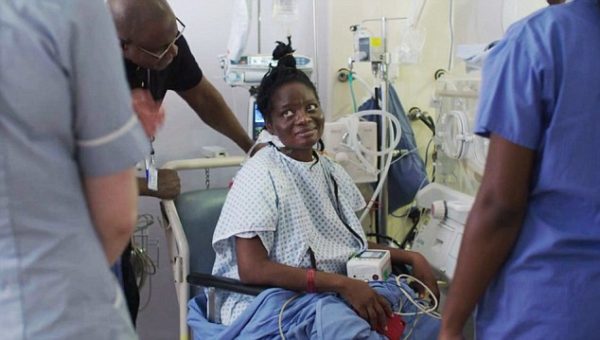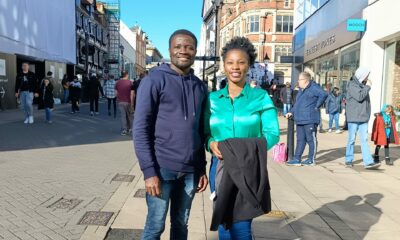News
Nigerian Woman in £500,000 Debt after Giving Birth to Quadruplets at UK Hospital
A Nigerian woman racked up a £500,000 bill after given birth to quadruplets at a UK hospital.
The 43-year-old woman, named Priscilla, who had intended to give birth to the babies in Chicago, U.S where she has family, was turned away by border officials upon arrival.
The officials said she did not have required documents from a hospital stating that she had the money to pay for the delivery.
Priscilla said she was returning to Nigeria through London when she started having contractions shortly after landing at Heathrow airport. This took place in November 2016, three months to her Expected Day of Delivery (EDD)
She was taken to the Queen Charlotte’s and Chelsea Hospital in West London, part of Imperial College Hospital, where she delivered the four babies.
Unfortunately, one died shortly after delivery, and another passed on last Saturday. The other two are still being treated in the hospital’s neonatal intensive care ward.
Hospital staff estimates that the total bill for the highly complex birth and the care of the babies is already more than £500,000. The cost of treating one baby in neonatal intensive care is £20,000 a week.
Priscilla, who is a healthcare worker in Nigeria, is currently staying at a hostel run by a charity and is unable to afford the bill.
Her husband is in Nigeria, and cannot come to Britain to help take care of her as he does not have enough money for a visa or the flight.
Priscilla underwent IVF treatment, which has a high risk of multiple births, as she was struggling to conceive naturally due to her age.
She was told by her doctor to fly to the US to have her babies, as Nigerian hospitals do not have the ‘facilities to cater for the children’.
Speaking to Terry Facey, the overseas visitor manager after being warned of the high cost of treatment, Priscilla said: ‘It’s only money. Money can’t buy life. The last bill I had was £331,000 but – even if I worked every day – I would never earn that much money. My kids are priceless.’
‘Those invoices are going to be huge … 20 grand a week for each baby (in intensive care),’ Facey, who had worked for the trust for about 12 years trying to collect bills for overseas patients said. ‘We will gently push forward and do what we have to do, we’re governed by the rules and regulations. They seem a bit fruitless at times,’ he added.
Earlier this year, it was reported that a yet to be identified Nigerian woman, racked up a £350,000 bill at Luton and Dunstable University Hospital (a National Health Service Trust) in the UK, after she had a caesarean section in 2015.
She was transferred to there from another hospital because of pregnancy complications. Her twins then spent two months in intensive care.
All NHS Trusts are mandated to treat patients first before requesting for any form of patients and this is thought to cost about £280 million a year, with health tourists using the most of that amount.
Facey is also chasing a bill of £59,000 from a 56-year-old woman from the Philippines who underwent heart surgery. She was visiting her sister in November when she became ill and had the procedure in the renowned cardiac unit at trust’s Hammersmith hospital.
She has since recovered and flown home with her sister, but neither are able to pay the bill.
Facey added that some other patients frequently ‘disappear into the community’ even before he gets the chance to hand them an invoice.
He said that a Palestinian man had an operation to remove kidney stones, discharged himself shortly after procedure. He had claimed he was an asylum seeker and therefore exempt from NHS charges.
‘There’s this assumption that its free of charge, but that isn’t the case. Some people might say I’m hard hearted but I wouldn’t accept that at all. I have a capacity to ask a difficult question of someone in very difficult circumstances.
You certainly have to distance yourself emotionally. Turn your emotions off. Without that, you wouldn’t get the job done.
It’s a question of informing people that they’re going to be charged on the one hand, but also of informing them that they will be treated appropriately on the other,’ Facey said.
Facey says the majority of cases involve overseas patients who have fallen ill whilst visiting relatives in the UK.
He says only a few are health tourists deliberately targeting the NHS. A spokesman for Imperial College Healthcare NHS Trust declined to comment.
Cases like these and more are featured on BBC Two’s new documentary – Hospital: “A ground-breaking 6-part series in which one NHS Trust opens its doors to reveal how they make the toughest decisions of all.”
Credit: DailyMail

























